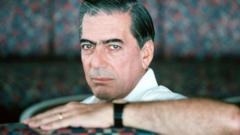**Vargas Llosa's contributions to literature and his tumultuous political journey reflect the intricate sociopolitical landscape of Latin America. His works, filled with profound insights on power and society, have cemented his status as a literary giant.**
**Mario Vargas Llosa: A Legacy of Latin American Literature and Controversy**

**Mario Vargas Llosa: A Legacy of Latin American Literature and Controversy**
**Renowned author and Nobel laureate Mario Vargas Llosa has passed away at 89, leaving behind a complex legacy marked by literary brilliance and political contention.**
Mario Vargas Llosa, the influential Peruvian writer and Nobel Prize laureate, has died at 89, marking the end of an era in Latin American letters. Known for his powerful storytelling and social critique, Vargas Llosa authored more than 50 works, which have made an indelible impact on both literature and politics throughout the continent and beyond.
Born in 1936 in Arequipa, Peru, Vargas Llosa's childhood was marked by upheaval following his parents' separation. He navigated an early life moving between Bolivia and back to Peru, where he would later delve into writing, crafting his first play at the age of 16. His literary debut came with "The Time of the Hero" (1962), which tackled corruption and brutality within a military academy, drawing ire from military officials and showcasing his fearless approach to addressing societal issues.
Vargas Llosa was a key figure in the Latin American Boom, a literary movement characterized by avant-garde storytelling and politically charged narratives during the late 20th century. His works often depicted the stark realities of authoritarian regimes, violence, and the complexities of identity in Latin America. His second novel, "The Green House" (1966), pushed boundaries further, addressing the intersections of power through provocative themes in a variety of settings.
Vargas Llosa's relationship with fellow Nobel laureate Gabriel García Márquez was famously tumultuous, culminating in a punch thrown at a film screening over differing political ideologies, particularly regarding Castro's Cuba. Their eventual reconciliation highlighted the complex dynamics among literary figures during a politically charged era.
Vargas Llosa's political journey reflected his evolving perspectives, initially aligning with leftist ideologies before becoming disillusioned, particularly after witnessing the suppression of dissent in Cuba. In 1990, he ran for the presidency of Peru as a candidate for the center-right, though he was ultimately defeated.
Throughout his career, Vargas Llosa faced criticism for various political stances, including his handling of the Uchuraccay massacre investigation, which clashed with views regarding indigenous communities and state violence. Despite controversies, his literary contributions remained unparalleled, with notable novels such as "Conversations in the Cathedral" (1969) and "The Feast of the Goat" (2000) exploring dictatorship and the abuse of power.
In his later years, Vargas Llosa continued to engage in public discourse, making provocative claims about the implications of press freedom and the status of feminism in literature, which attracted widespread scrutiny. His personal life also drew attention, particularly after his divorce from his wife of 50 years and relationship with socialite Isabel Preysler.
Vargas Llosa’s passing is not just a loss for Peru but for the literary world, as he leaves behind a legacy brimming with critical insights and a passionate interrogation of the political landscapes of his time. His influence will resonate through future generations of writers and thinkers, marking the end of an era for the Latin American Boom's luminaries.
Born in 1936 in Arequipa, Peru, Vargas Llosa's childhood was marked by upheaval following his parents' separation. He navigated an early life moving between Bolivia and back to Peru, where he would later delve into writing, crafting his first play at the age of 16. His literary debut came with "The Time of the Hero" (1962), which tackled corruption and brutality within a military academy, drawing ire from military officials and showcasing his fearless approach to addressing societal issues.
Vargas Llosa was a key figure in the Latin American Boom, a literary movement characterized by avant-garde storytelling and politically charged narratives during the late 20th century. His works often depicted the stark realities of authoritarian regimes, violence, and the complexities of identity in Latin America. His second novel, "The Green House" (1966), pushed boundaries further, addressing the intersections of power through provocative themes in a variety of settings.
Vargas Llosa's relationship with fellow Nobel laureate Gabriel García Márquez was famously tumultuous, culminating in a punch thrown at a film screening over differing political ideologies, particularly regarding Castro's Cuba. Their eventual reconciliation highlighted the complex dynamics among literary figures during a politically charged era.
Vargas Llosa's political journey reflected his evolving perspectives, initially aligning with leftist ideologies before becoming disillusioned, particularly after witnessing the suppression of dissent in Cuba. In 1990, he ran for the presidency of Peru as a candidate for the center-right, though he was ultimately defeated.
Throughout his career, Vargas Llosa faced criticism for various political stances, including his handling of the Uchuraccay massacre investigation, which clashed with views regarding indigenous communities and state violence. Despite controversies, his literary contributions remained unparalleled, with notable novels such as "Conversations in the Cathedral" (1969) and "The Feast of the Goat" (2000) exploring dictatorship and the abuse of power.
In his later years, Vargas Llosa continued to engage in public discourse, making provocative claims about the implications of press freedom and the status of feminism in literature, which attracted widespread scrutiny. His personal life also drew attention, particularly after his divorce from his wife of 50 years and relationship with socialite Isabel Preysler.
Vargas Llosa’s passing is not just a loss for Peru but for the literary world, as he leaves behind a legacy brimming with critical insights and a passionate interrogation of the political landscapes of his time. His influence will resonate through future generations of writers and thinkers, marking the end of an era for the Latin American Boom's luminaries.





















